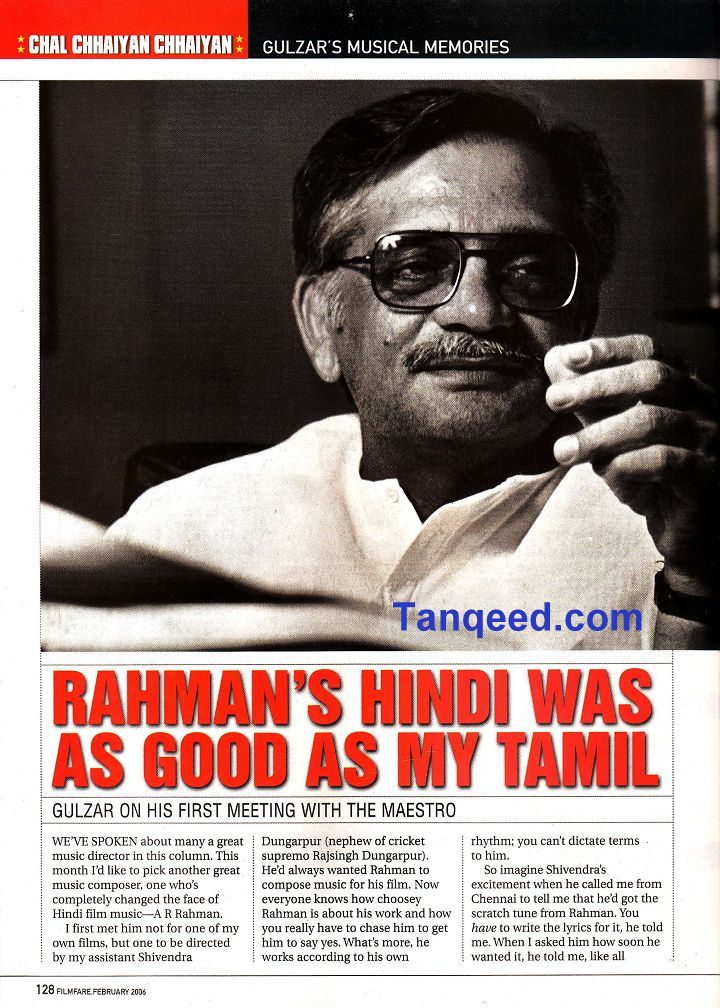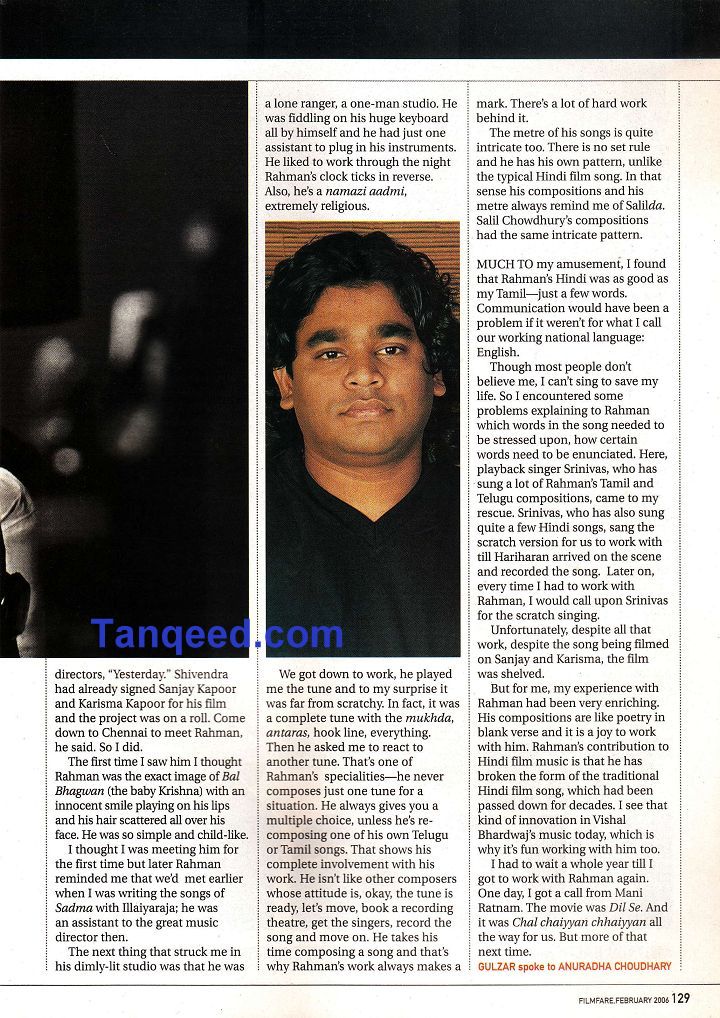Check out Gulzar on his first meeting with A.R. Rahman from this Filmfare Interview from February 2006. August 18th was Gulzar’s birthday and I would have posted this then but I did not know I had this with me.


Check out Gulzar on his first meeting with A.R. Rahman from this Filmfare Interview from February 2006. August 18th was Gulzar’s birthday and I would have posted this then but I did not know I had this with me.


Cost : 75 cr (60 in India + 15 in overseas)including PnP Satellite :35 (after tax) Music/dvd/dth :12 cr...
The music that plays during Prabhu Deva’s invisible dance from the song Muqabla Muqabla from Hum Se Hai Muqabala...
Thanks to hithere for this.
Yesterday was Rowan Atkinson’s birthday. So Check out Hero No. 1 Scene copied from Mr. Bean from the episode...
Kishore Namit Kapoor, acting guru, author and spiritual seeker, says spirituality permeates every aspect of the craft of acting....
Good read. Wonder what movie was that of Sanjay and Karishma which got shelved.
Thanks. Googled a lot but couldn’t find out any more details apart from that it also starred Chandrachur. May be @hithere can find out more 🙂
The movie name is “Waqia”. Apparently the director is school friend with ARR.
Chandrachur one is a different movie(Ittefaq) by same director.
https://groups.yahoo.com/neo/groups/arrahmanfans/conversations/messages/68528
Thanks for the awesome links.
Never heard of the movie Waqia before.
https://musicrahman.blogspot.com/2007/02/year-1995.html
https://groups.google.com/forum/#!topic/rec.arts.movies.local.indian/Crpzd12yYiQ
WAQIA (1995)
I get a feeling that Gulzar is generous here. I dont think poet / personality of his calibre likes tunes to be heard first and then compose a song based on it. I think he likes VB more – way more than Rahman, as VB understands the grammer and I have a feeling he doesnt compose tune first.
Composer A.R. Rahman on His Transition to Hollywood and ‘Slumdog Millionaire’
Presumably, somewhere on the second floor of composer-songwriter-singer-multi-instrumentalist A.R. Rahman’s Los Angeles house one might find a bedroom, or a television, or any of the other trappings of a residential home. But as for the ground floor, it’s hard to take a step without trodding upon some stray piece of musical equipment, with guitars, drums, a grand piano, a bright red Continuum Fingerboard, mixing boards, two turntables, microphones and synthesizers as far as the eye can see. A veteran composer of Hollywood, Tamil, Hindi and Chinese films, the two-time Oscar-winner will accept an honorary doctorate from Berklee College of Music on Oct. 24, and should the school ever find itself short of instruments, they know who to call.
How do you approach music education?
I’ve learned so much from being put in situations where you have to come up with crazy stuff, which is where you come up with the most unique ideas. I have a conservatory back in India, and that’s what I’m doing there: Pushing people into certain situations to see what they do.
What conditions need to be in place for you to feel artistic freedom?
Team (members) working together have to love each other. I have to love the director’s work, I have to love his philosophy, and he has to recognize what I’ve been doing. It starts there. You can’t work with freedom if someone is constantly saying, ‘If he doesn’t do this well, I’m going to fire him.’ I’ve refused a lot of movies because of that.
You compose for Hollywood films, Hindi films, Tamil films and Chinese films, and your music often incorporates styles from all over the world. How do you absorb so many different styles?
To learn a different style, you have to respect the culture. You have to start by loving the people, the way of life, and then ultimately the music comes by itself as a part of that respect. It’s not something you can just pick up and use like a sample.
Did you ever feel pigeonholed after “Slumdog Millionaire?”
Two or three years back, I consciously avoided doing (Hollywood) films that had Indian themes; I’d rather do something like “Couples Retreat.” Now I feel like it’s fine, it’s settled. I’m doing what I love, and I’m scripting a musical movie back in India, and that’s both terrifying and exciting.
What instruments do you play for recreation?
Piano. I had never actually owned a piano until a few years back, just keyboards, until finally Yamaha gifted me a piano. Then I got a Steinway and a Bosendorfer. It’s such an addiction, to sit and play just to play. I also have the Continuum Fingerboard, which is such a fascinating instrument. Sometimes I’ll start playing it and not realize until it’s three hours later.
How did you develop such a catholic approach to composition?
When I was young, I used to listen to so much crazy music because I was doing all this boring film work in the studio with other composers. So to refresh myself, I’d go out and listen to all kinds of crazy stuff, anything that wasn’t Indian. I think somewhere in my mind I developed the kind of comfort zone where I felt I could adapt to anything. It was hard to sell sometimes, people would say ‘no, that’s too weird.’ … But now I’m often going back to more traditional melodies, because everyone has become so freaky.
Are you surprised that more Indian composers haven’t made the transition to Hollywood?
It’s not an easy transition. And it’s not about the musical transition, but the lifestyle. How much are you willing to sacrifice? Your food? Your comfort zone? In India, you might have two drivers, two cars, and a lot of servants to take care of everything. Then you come here, and you have to do your own laundry. For me, it was a kind of redemption and a catharsis to come out here and feel (this) kind of independence. I can walk around and not be spotted. I can walk to the store and sit in a park. It took a while for me to adjust, but there’s a freedom and a sense of relaxation that is beautiful. In India, the only thing was writing music, I could never go out.
What do you do to keep the creative currents flowing?
The pressure that I used to have before is not there anymore, those days where there were like 12 movies at the same time and each one needs a concept where everyone can sing the songs. Because I’m working in three different places now, I’ll sometimes switch sensibilities, take something Eastern and bring it to a Western film to try to cheat my mind. And sometimes it works. Another way to bring out ideas and cleanse yourself is fasting. Fasting takes all the negative energy out and allows you to feel at peace. Subconsciously there’s something hidden in us. It’s a secret sometimes.
Link
Gulzar at Q & A Session after Libaas Screening moderated by Vishal Bhardwaj. Thanks to Pavan Jha.